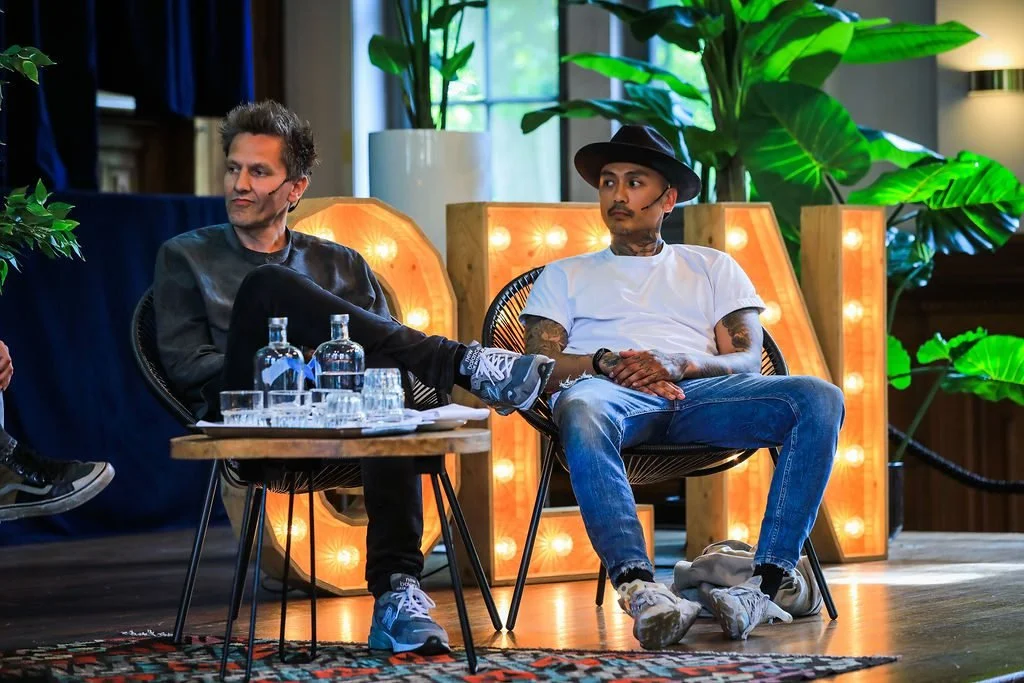“I actually didn't like leading that much at first because I hadn’t found a purpose in leading yet. I think the moment when I found that purpose was when I realized I could help people grow and elevate themselves. That gave me that same feeling of gratitude that you get when you create stuff.”
Welcome to the Inspirational Leaders Series, a collection of short interviews with sharp, impactful leaders that I know and respect—because the business world needs more refreshing people like them.
From intern to Global Head of Animation to Managing Director, @Pierre Nelwan has made his way through every run of the ladder at Media.Monks, a marketing and advertising company. His teams have produced award-winning work for clients like Amazon, Google, and VICE (including 200 Cannes Lions awards!). He cares about not only delivering the best work but also making Media.Monks the best place to work.
(Note: This interview has been lightly edited for length and clarity.)
WHAT MOTIVATES YOU?
I've been a maker for most of my career. I've been a designer and animator. When I went into leading teams, there was one moment where I felt like I shifted from a maker into a manager. I actually didn't like leading that much because I hadn’t found a purpose in leading yet. I think the moment when I found that purpose was when I realized I could help people grow and elevate themselves. That gave me that same feeling of gratitude that you get when you create stuff. That allows me to stick to the role of being a manager. I love being a manager because I know where I get my energy from. I get energy from having results in a positive way.
IT SOUNDED LIKE YOU FLOUNDERED FOR BIT BECAUSE YOU DIDN’T HAVE SOMETHING THAT CREATED THAT FEELING OF GRATITUDE FOR YOU.
Yes, and this is something that I often see in leadership. You're not running a sprint. It's a long-term investment in growth. Finding that purpose, what gets you excited, is essential.
CAN YOU TALK ABOUT SCALING YOUR IMPACT BY LEADING OTHERS?
If you're a creator, if you're if you're making something, then you're responsible. It's pretty linear. You'd create something, you’d win an award. Things change when you are leading a group of people. For me, it started with a couple, then it went to five, then it went to ten. And the higher the number goes up, the more impact you can create if your leadership is right. I think that's such an interesting thing to play around with, to realize you do have an impact in a positive way, but of course, also, in a negative way if you use your cards wrong. I think that's leadership: Making sure that you steer or create an environment to let that bloom, to nourish that talent, to help people get the best out of themselves.
YOU EMPHASIZE HAVING A DRIVING PURPOSE. THIS IS SOMETHING I HELP LEADERS AND TEAMS WITH A LOT BECAUSE THERE’S SO MUCH RESEARCH THAT SHOWS WHEN YOU HAVE CLEAR PURPOSE, YOU ARE MORE MOTIVATED.
I had to reinvent myself because the joy I was getting was linear. You get an award and a pat on your back. That's the little endorphin that you create. It's like an endless cycle. Once I got into leadership, my joy became more indirect because it's about investing in people. You see all the results that are coming and growing from decisions you made a while back. That made me move into this leadership space even more.
ARE THERE ANY PARTICULAR TOOLS OR METHODS THAT YOU’VE COME ACROSS IN YOUR JOURNEY THAT HAVE HELPED YOU BECOME A MORE IMPACTFUL LEADER?
I found out that I have a personality type that lends very well in a leadership position. And I think that you need to have that itch to lead to be comfortable in that position of leading. I don't think anyone can just lead. But the funny thing was how people had to remind me that I was a good leader. I wasn't aware that I was a good leader. And it sounds really weird if I say this now. But I had people come up to me and say, “How do you do that? People listen to you.”. I wasn’t aware of that until a lot of people said it. I think tools can help you navigate, but they will not automatically make you a leader. I think you need to have some sort of a foundation already of wanting to be there.
GIVING FEEDBACK TO EMERGING LEADERS IN SO IMPORTANT.
If I didn’t have that feedback, I may not have believed in myself enough to pursue leadership. So yeah, 100%. With my mentors, I got a lot of freedom to find myself and my leadership style as well. When your environment allows you the space to grow, your chances of succeeding increase.
IT’S SO IMPORTANT FOR PEOPLE TO SEE DIFFERENT TYPES OF PEOPLE IN LEADERSHIP POSITIONS.
This is on my mind constantly. How can I be a better leader? You have good days and you have bad days. But purpose is the thing that drives you and makes you make sure that you're going to push yourself. It’s also important to understand as a leader, you have your bad days. You have your days where stuff just doesn't click or the climate that you're in is challenging. I do my best to understand what is fueling me and what is keeping me up, and I think I have a responsibility to do that as well. Because if I have a quality that's gonna help people be the best version of themselves, then I'm like, “Let's go all in for it.”. I think a lot of leaders think like that.
HOW DO YOU KEEP YOURSELF ENERGIZED AMIDST THE DEMANDS AND STRESS OF LEADERSHIP?
I think this is often overlooked. People only see the work and they often disregard anything outside of that. I think in the end, it's a balance. If your home situation is foundationally not stable, it's going to be difficult to do whatever you're going to be doing outside. So I think that is a really important factor. It can be mentally exhausting because you're in meetings and you're in conversations, and you're thinking about where you’re going to be over the next six months, so it's all in the head. So when I'm done working, my brain is literally fried. It's like, okay, you just need to take a rest. But it also feels good to be exhausted. So for me to get that right balance is to physically exhaust myself in the gym.
I do really pretty intense workouts and I do a lot of kickboxing and strength training in the gym. I get a lot of energy from those things. And it's funny, somebody said to me, “What you're doing is movement meditation.”, because I don't like to sit still. I need to move and I need to physically exhaust myself.
I also find a lot of joy in spending time with my kids. To me, that’s the signal that, okay, it's not about work anymore. It's about, “How was your day?” That keeps me grounded. Sometimes I catch myself thinking and I remind myself to shut it off. I think most of the time I'm doing a pretty good job of separating work time from relaxing time.
IT’S EASY FOR PEOPLE TO FALL INTO THE TRAP OF FIXATING ON THE WORK PART AND NOT REALIZING THAT IF THE OTHER PARTS OF THEMSELVES ATROPHY, THEY’RE NOT GOING TO BE EFFECTIVE LEADERS.
I do that with my best friends every now and then. Sometimes I cannot shut up about the work that I'm doing. Then I get checked and they say, “Ah, stop it, I don't want to hear about that.”. My mom is the same way when I go home. It’s important that there's a clear distinction between your personal life and work life.
IS THERE ANYTHING YOU’VE LEARNED ABOUT THE INFLUENCE PART OF LEADERSHIP THAT YOU’D LIKE TO SHARE?
It's a fascinating concept. The moment you are responsible for one to three people, your influence increases. They know that you're responsible for them from a growth perspective or career perspective. You need to be aware of that as a leader. You're influencing people's lives at work and you need to take that seriously. You need to have people skills and you need to know how to connect on various levels, because every person has a different way of connecting. I think that influence is making sure that people are connected.
WHAT DO YOU NEED TO BE CAREFUL ABOUT WITH INFLUENCE?
Influence means that you can connect with people and your behavior will influence their behavior. It’s fascinating because it can go both ways. You can have bad influence and you may not be aware of it.
WHAT IS A CHALLENGE THAT YOU HAVE EXPERIENCED THAT HAS TURNED YOU INTO A BETTER LEADER?
I think a lot of my success has to do with impostor syndrome because I’m always thinking, “Am I doing well enough?”. I think understanding that questioning yourself comes with leadership and embracing that allows you to be more confident. It's a healthy way of moving forward because being afraid like that keeps you on edge. It keeps you from feeling overly comfortable, on autopilot. I know, it is sometimes challenging, but I also know it's a part of the process. It's the growth mindset of moving forward. You're going to deal with challenges along the way. It's how you navigate through that that makes you a great leader.
When your role is bigger, and you have more responsibilities, everything is magnified. So when there's a problem, there's a big problem. How do you navigate through that? I think it's good to expose yourself to that, and to let people see that you're being exposed to it. Because in the end, I think people follow authenticity. I follow authenticity. Leadership should be honest and real.
IT SOUNDS LIKE YOU HAVE A HEALTHY RELATIONSHIP TO THE CHALLENGES OF LEADERSHIP.
I understand that it’s a process. My autopilot will be like, “Okay, I’m comfortable where I'm sitting and doing my thing.”. And then I need to go through something uncomfortable to grow again.
YOU TALKED ABOUT BEING TRANSPARENT IN LEADERSHIP. THAT SORT OF AUTHENTICITY HELPS PEOPLE CONNECT WITH YOU MORE THROUGH CHALLENGES.
The moment where I was the most challenged in my role is when I questioned whether I should share my human side. My safety net is always being as authentic as you can. You sometimes need to put the managing director hat on and that's fine. For me, it really helped going back to connecting on a personal, human level. That always works. Relating on a human level is how you capture attention.



